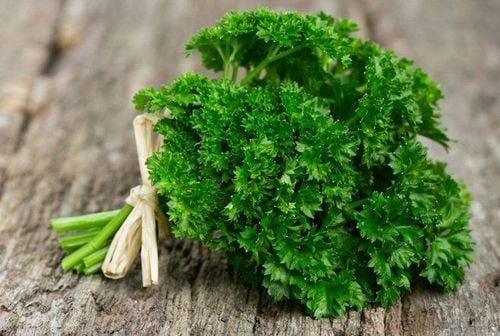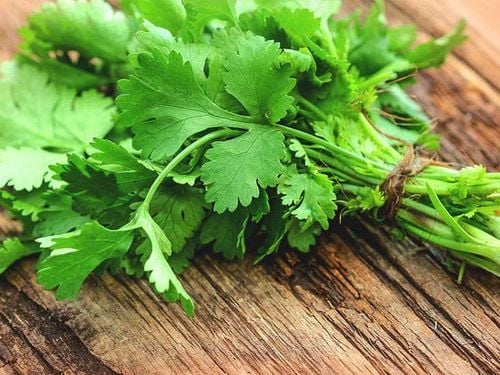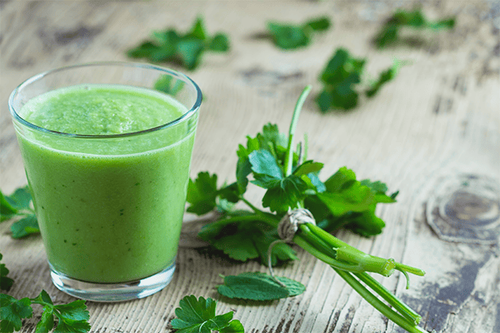This is an automatically translated article.
Coriander is an herb that is often used to cook with dishes such as soups, salads... Its ingredients are rich in antioxidants, eating coriander brings a number of health benefits such as: Lower blood sugar, boost immunity, benefit heart health.
1. What is coriander?
Coriander is an herb that comes from the Coriandrum sativum plant and is related to parsley, carrots, and celery. In the United States, Coriandrum sativum seeds are known as coriander seeds. In other parts of the world, they call them coriander seeds and coriander leaves. In addition, the plant is also known as Chinese parsley.
Coriander is used in dishes such as: Soups and salads, as well as in Indian, Middle Eastern and Asian meals such as curries and masalas. Coriander leaves are usually used whole, while the seeds are used dried or ground.
2. What is the effect of eating coriander?
Below are 8 impressive health benefits of eating coriander.
2.1. Coriander can help lower blood sugar High blood sugar is a risk factor for type 2 diabetes. Coriander seeds, extracts and oils from coriander may help lower blood sugar. In fact, people with low blood sugar or taking diuretics should be cautious when eating coriander because it is very effective in lowering blood sugar.
Animal studies show that coriander seeds lower blood sugar by boosting the activity of enzymes that help remove sugar from the blood. Another study in rats with obesity and high blood sugar showed that a single dose of 9.1mg/body weight or 20mg/kg coriander seed extract reduced blood sugar by 4mmol/L. for 6 hours, and it had the same effect as the blood sugar drug glibenclamide.
Another study showed similar results that the same dose of coriander seed extract reduced blood sugar while increasing insulin release in diabetic rats compared with control animals.

Ăn rau mùi có thể giúp hạ đường huyết ở người đường máu cao
2.2. Antioxidant-rich coriander helps boost immunity Coriander provides several antioxidants, which prevent cell damage caused by free radicals. These antioxidants have been shown to fight inflammation in the body. Antioxidant compounds include: Terpinene, quercetin, and tocopherols, which may have anticancer, immune-boosting, and neuroprotective effects (according to test-tube and animal studies). In addition, in vitro research shows that the antioxidants of coriander seed extract can reduce inflammation and slow the growth of lung and prostate cancer cells. , breast cancer and colon cancer.
2.3. Coriander may benefit heart health Several studies conducted in animals and test tubes suggest that coriander may reduce risk factors for heart disease, such as high blood pressure and cholesterol levels. LDL (bad cholesterol). Coriander extract seems to act as a diuretic, helping the body get rid of excess sodium and water. This can lower blood pressure.
Or some other studies also show that coriander can also help lower cholesterol. Research conducted on rats showed that the rats fed coriander seeds had significant reductions in LDL cholesterol (bad cholesterol) and increased HDL cholesterol (good cholesterol). What's more, many researchers have also found that eating pungent herbs and spices like coriander helps reduce sodium intake, which can also improve heart health.
2.4. Coriander may protect brain health Brain diseases include: Parkinson's, Alzheimer's, and multiple sclerosis, which are linked to inflammation. The anti-inflammatory properties of coriander may protect against these diseases.
A study conducted in rats showed that coriander extract protected against nerve cell damage following drug-induced seizures. This may be due to the antioxidant properties of coriander. Furthermore, this study also noted that coriander also improves memory. And coriander may offer benefits for Alzheimer's disease.
In addition, coriander can also help manage anxiety. Animal studies have shown that coriander extract is almost as effective as Diazepam, a popular anxiety medication, in reducing the symptoms of this condition.

Rau mùi có thể bảo vệ sức khỏe bộ não của người dùng
2.5. Coriander can promote digestion and gut health The oil extracted from coriander seeds can speed up and promote healthy digestion. An 8-week study in 32 people with irritable bowel syndrome (IBS) found that 30 drops of an herbal medicine containing coriander three times daily significantly reduced abdominal pain. , bloating and discomfort compared with the placebo group.
Coriander extract is used as an appetite stimulant in Iranian traditional medicine. One study conducted on rats noted that coriander helped increase appetite compared with control rats given water or nothing.
2.6. Coriander can fight infections Coriander contains antibacterial compounds that may help fight certain infections and food-borne illnesses. Dodecenal is a compound in coriander that can fight bacteria like Salmonella, which can cause life-threatening food poisoning.
In addition, a test-tube study found that coriander seeds are among a number of spices in India that can fight bacteria that cause urinary tract infections (UTIs).
Other studies have also shown similar results with the effect of coriander should be used in antibacterial formulations. Because it has the ability to fight foodborne illnesses and nosocomial infections.
2.7. Coriander may protect skin Coriander may have a number of skin benefits, including mild rashes such as dermatitis. In one study, coriander extract failed to treat diaper rash on its own in infants but can be used along with other compounds that soothe the condition as an alternative treatment. Other studies also note that the antioxidants in coriander extract can help prevent cell damage that leads to faster skin aging, as well as skin damage caused by ultraviolet B radiation.

Rau mùi có thể bảo vệ làn da nếu được sử dụng đúng cách
Furthermore, people who used coriander leaf juice for skin conditions such as acne, melasma, oily or dry skin found it effective. However, research on these uses still lacks a basis and scientific basis.
2.8. Coriander is easy to use in the diet All parts of the Coriandrum sativum plant are edible, but its seeds and leaves taste very different. While the coriander seeds have an earthy flavor, the leaves are spicy and citrus-like - although some people find that they taste like soap.
Whole coriander seeds can be added to baked goods, pickled vegetables, grilled vegetables and cooked lentil dishes. The processing will warm the coriander seeds releasing the aroma.
Meanwhile, coriander leaves - also known as coriander, are best used to garnish soups or use in cold pasta salads, lentils, fresh tomato salsa, or Thai noodle dishes. Alternatively, you can also puree them with garlic, peanuts, coconut milk, and lime juice to create a blend for burritos, salsa, or marinades.
In a nutshell, coriander is an antioxidant-rich herb that has many culinary uses and health benefits. It can help lower blood sugar, fight infections, and promote heart, brain, skin, and digestive health.
Vinmec International General Hospital with a system of modern facilities, medical equipment and a team of experts and doctors with many years of experience in medical examination and treatment, patients can rest assured to visit. examination and treatment at the Hospital.
To register for examination and treatment at Vinmec International General Hospital, you can contact Vinmec Health System nationwide, or register online HERE.
Reference source: healthline.com
SEE MORE
Beautify skin, treat colds from coriander What do you know about vegetable protein? 6 taboos when eating vegetables









